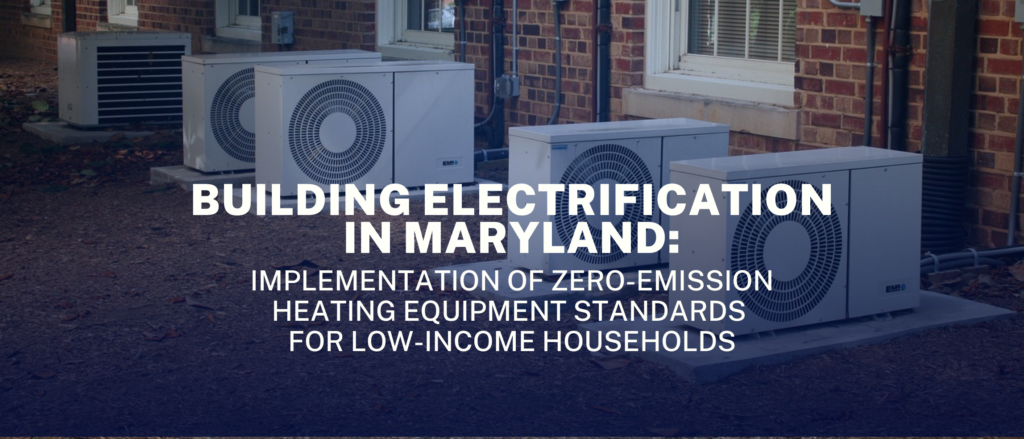Maryland can help residents save up to $1,500 annually on energy bills, create healthier air, and meet the state’s ambitious climate goals by pursuing a targeted approach to equitably upgrade low-income households with highly efficient heat pumps and heat pump water heaters under a Zero-Emissions Heating Equipment Standard, according to a new report published today by the Sierra Club Maryland Chapter and the Center for Progressive Reform.
In Building Electrification in Maryland: Implementation of Zero-Emission Heating Equipment Standards for Low-Income Households, the report’s authors show that Maryland would need to replace approximately 14,000 space heating units and 21,000 water heaters in low-income households each year with heat pumps starting in 2029, at an additional annual cost of $185 million. Targeting low-income households to fully implement these upgrades would provide $145 million in health benefits, $350 million in energy savings, and $311 million in climate benefits each year by 2050, creating a massive return on investment.
“Maryland’s low-income residents have borne the brunt of high energy bills because they’re stuck with the most inefficient equipment, locking them into higher bills,” said Josh Tulkin, Director of the Sierra Club Maryland Chapter. “These higher bills add up, creating mounting utility debt and forcing residents to choose between staying warm and putting food on the table. Maryland can provide energy relief today and for decades in the future by scaling up agency capacity and shoring up existing funding to make sure these residents are first in line to reap the benefits of efficient electric equipment. These actions will transform the market for residents statewide in the process.”
Low-income residents, many of whom rely on inefficient electric resistance heat and delivered fuels such as heating oil and propane, are prime candidates for highly efficient electric equipment such as heat pumps that can lower their bills today. According to analysis by the Center for Progressive Reform and Sierra Club Maryland Chapter, households upgrading from electric resistance to highly efficient heat pumps for space and water heating are expected to save $1,361 each year on energy bills. Households upgrading from heating oil and propane can likewise save anywhere from $865 to $1,495 per year on energy bills when they adopt highly efficient heat pumps. Savings from upgrading gas customers will increase rapidly in the 2030s.
“Upgrading households with efficient electric equipment such as heat pumps provides massive benefits for our health, our climate, and our pocketbooks. Yet too often, low-income households are overlooked for these upgrades,” said Bryan Dunning, co-author and senior policy analyst at the Center for Progressive Reform. “The state needs to equitably implement its Zero-Emissions Heating Equipment Standard and ensure Maryland’s most vulnerable residents reap the economic and health benefits of modern, efficient electric equipment.”
As Maryland works toward a 2029 implementation of this standard, report authors recommend state leaders pull from existing resources such as the Strategic Energy Investment Fund (SEIF) and EmPOWER Maryland, as well as scale up low- or no-cost financing to pay for these upgrades at no extra cost to state taxpayers. Maryland can also establish new revenue for heat pump installations via the Clean Heat Standard, under development at the Department of the Environment (MDE). By building up agency capacity, experimenting with new technologies such as window heat pumps, and increasing consumer and HVAC contractor engagement, Maryland can further bring down the cost of heat pumps for all residents.
“By using dedicated funding streams to scale up new technologies like window heat pumps that could dramatically bring down the cost of installation for residents, Maryland leaders could get a massive bang for their buck while improving residents’ health and quality of life,” Dunning said.
Tulkin noted that energy efficiency upgrades would also pay dividends for the climate. “In addition to lowering bills for low-income families, installing energy efficient heat pumps in low-income homes will make a significant contribution to achieving Maryland’s climate goals by reducing greenhouse gas emissions,” Tulkin said.
The report is available at https://progressivereform.org/publications/building-electrification-md-rpt.
# # # # #
The Center for Progressive Reform harnesses the power of law and public policy to create a responsive government, a healthy environment, and a just society.
The Sierra Club Maryland Chapter is a grassroots environmental organization working for the protection of Maryland’s land, air, and water, as well as a just and equitable transition from dirty fossil fuels to a clean energy future for all.

